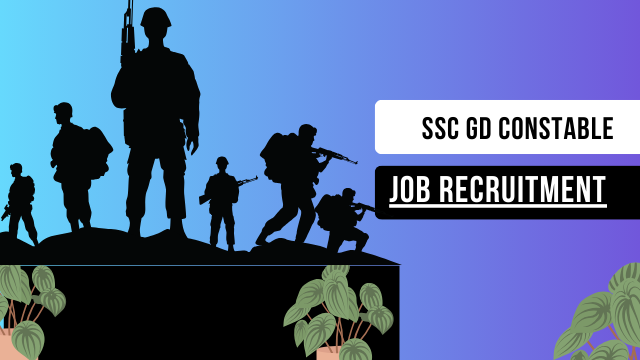The Staff Selection Commission (SSC) has rolled out the much-awaited notification for the SSC GD (General Duty) Constable Recruitment 2024. This recruitment drive is set to fill a massive number of vacancies across various Central Armed Police Forces (CAPFs) such as the BSF, CISF, CRPF, ITBP, SSB, and others. For aspiring candidates, this is a golden opportunity to serve in the paramilitary forces of India. This detailed guide covers every aspect of the recruitment process, ensuring that you are well-prepared to navigate each step, from applying online to acing the final selection rounds.
Introduction to SSC GD Constable Recruitment 2024
The SSC GD Constable exam is a gateway to secure a job in India’s premier security forces. The recruitment process is extensive, and only the most dedicated and prepared candidates make it through. Understanding every detail—from the number of vacancies to the eligibility criteria, and from the exam pattern to the final selection process—is crucial for aspirants who wish to maximize their chances of selection.
What is SSC GD Constable?
The SSC GD Constable recruitment is an annual exercise conducted by the Staff Selection Commission to recruit constables for various forces under the Ministry of Home Affairs (MHA). These forces include the Border Security Force (BSF), Central Industrial Security Force (CISF), Central Reserve Police Force (CRPF), Indo-Tibetan Border Police (ITBP), Sashastra Seema Bal (SSB), and others. The role of a GD Constable is vital for maintaining internal security, managing border security, and ensuring law and order across the country.
In-Depth Vacancy Analysis
The SSC GD Constable Recruitment 2024 offers an expansive number of vacancies spread across various CAPFs, making it one of the largest recruitment drives in recent years. Here is a more granular breakdown of the vacancies:
Vacancy Distribution by Force
| Force | Male Vacancies | Female Vacancies | Total Vacancies |
|---|---|---|---|
| Border Security Force (BSF) | [Vacancies] | [Vacancies] | [Total] |
| Central Reserve Police Force (CRPF) | [Vacancies] | [Vacancies] | [Total] |
| Central Industrial Security Force (CISF) | [Vacancies] | [Vacancies] | [Total] |
| Indo-Tibetan Border Police (ITBP) | [Vacancies] | [Vacancies] | [Total] |
| Sashastra Seema Bal (SSB) | [Vacancies] | [Vacancies] | [Total] |
| Assam Rifles | [Vacancies] | [Vacancies] | [Total] |
| Secretariat Security Force (SSF) | [Vacancies] | [Vacancies] | [Total] |
| Narcotics Control Bureau (NCB) | [Vacancies] | [Vacancies] | [Total] |
Note: The exact number of vacancies for each force will be updated as per the official notification.
Category-Wise Vacancy Breakdown
The vacancies are also distributed according to different categories, ensuring reservation for various communities as per government norms:
| Category | Male Vacancies | Female Vacancies | Total Vacancies |
|---|---|---|---|
| General (UR) | [Vacancies] | [Vacancies] | [Total] |
| Scheduled Caste (SC) | [Vacancies] | [Vacancies] | [Total] |
| Scheduled Tribe (ST) | [Vacancies] | [Vacancies] | [Total] |
| Other Backward Classes (OBC) | [Vacancies] | [Vacancies] | [Total] |
| Economically Weaker Section (EWS) | [Vacancies] | [Vacancies] | [Total] |
This detailed distribution ensures that candidates from all backgrounds have a fair opportunity to serve in the armed forces.
Critical Dates and Application Timeline
Being aware of the important dates is crucial for timely submission of your application and preparation for the examination. Below are the key dates for SSC GD Constable Recruitment 2024:
- Notification Release Date: [Date]
- Start Date for Online Application: [Date]
- Last Date for Online Application Submission: [Date]
- Deadline for Fee Payment (Online): [Date]
- Last Date for Offline Challan Generation: [Date]
- Exam Date (Computer-Based Test): [Date]
- Admit Card Release Date: [Date]
- Result Declaration Date: [Date]
- PET/PST Date: [Date]
Detailed Eligibility Criteria
Understanding the eligibility criteria is essential before applying for the SSC GD Constable Recruitment 2024. The eligibility criteria include parameters such as nationality, age limit, educational qualifications, and physical standards.
Nationality Requirements
- Indian Citizenship: The primary requirement is that the candidate must be a citizen of India.
- Nepal/Bhutan Nationals: Candidates who are citizens of Nepal or Bhutan may also apply, provided they have the necessary documents.
Age Criteria
- Minimum Age: 18 years
- Maximum Age: 23 years
Age Relaxation: The government provides age relaxation for candidates belonging to reserved categories as follows:
| Category | Age Relaxation |
|---|---|
| SC/ST | 5 years |
| OBC | 3 years |
| Ex-Servicemen | 3 years after deduction of the military service rendered from the actual age |
| Children and dependents of victims killed in the 1984 riots or communal riots of 2002 in Gujarat | 5 years (UR) |
Educational Qualifications
- Minimum Qualification: Candidates must have passed the Matriculation (10th class) examination from a recognized board by the application closing date.
Step-by-Step Application Process
The application process for SSC GD Constable Recruitment 2024 is conducted online through the official SSC website. Below is a detailed guide on how to complete the application:
Step 1: One-Time Registration
- Visit the Official Website: Navigate to the official SSC website (www.ssc.nic.in).
- New Registration: If you’re a new user, “New User? Register Now” link.
- Fill in Basic Details: Provide your name, date of birth, email ID, and mobile number to complete the registration.
- Login Credentials: Upon successful registration, you will receive a unique registration ID and password.
Step 2: Filling the Application Form
- Login: Use your registration ID and password to log in to the SSC portal.
- Personal Details: Enter your personal information such as name, gender, category, and address.
- Educational Qualifications: Fill in your academic details, including board name, year of passing, and marks obtained.
- Preference of Forces: Select your preference order for the CAPFs (BSF, CRPF, CISF, etc.).
Step 3: Uploading Documents
- Photograph: Upload a recent passport-sized color photograph. The photo should be between 20 KB to 50 KB in size.
- Signature: Upload a scanned copy of your signature. The signature should be in black ink and between 10 KB to 20 KB in size.
Step 4: Application Fee Payment
- Fee for General/OBC Candidates: [Fee Amount]
- Exemptions: SC/ST/PwD/Ex-Servicemen candidates are exempt from paying the fee.
- Payment Modes: The fee can be paid via credit card, debit card, net banking, or through SBI challan.
Step 5: Final Submission and Printout
- Review Your Application: Double-check all the entered information before submitting.
- Submit the Application: Once satisfied, submit the application form.
- Print the Application: After submission, take a printout of the application form for future reference.
Selection Procedure: Detailed Insight
The selection process for SSC GD Constable Recruitment 2024 is a multi-tiered procedure that includes a Computer-Based Test (CBT), Physical Efficiency Test (PET), Physical Standard Test (PST), and a Detailed Medical Examination (DME). Each stage is critical, and candidates must perform well in each to move to the next.
Stage 1: Computer-Based Test (CBT)
The CBT is the first hurdle in the selection process. It is an online exam with multiple-choice questions that test a candidate’s knowledge in various subjects. The detailed exam pattern is as follows:
| Subject | No. of Questions | Maximum Marks | Duration |
|---|---|---|---|
| General Intelligence & Reasoning | 25 | 25 | 90 minutes |
| General Knowledge & General Awareness | 25 | 25 | 90 minutes |
| Elementary Mathematics | 25 | 25 | 90 minutes |
| English/Hindi | 25 | 25 | 90 minutes |
| Total | 100 | 100 | 90 minutes |
Syllabus for CBT
- General Intelligence & Reasoning:
- Analogies: Identifying relationships between pairs of words, numbers, or figures.
- Spatial Visualization: Understanding and reasoning about space.
- Spatial Orientation: Determining the location of objects relative to oneself.
- Visual Memory: Recalling visual information.
- Discrimination: Differentiating between objects and patterns.
- Observation: Noticing and interpreting details.
- Relationship Concepts: Understanding the connection between objects.
- Arithmetic Number Series: Identifying patterns in sequences of numbers.
- Non-Verbal Series: Analyzing and completing sequences involving shapes and patterns.
- Coding-Decoding: Deciphering patterns of numbers, letters, or words.
- General Knowledge & General Awareness:
- Current Affairs: National and international news, including sports, culture, and politics.
- History: Major historical events, freedom movements, and significant personalities.
- Geography: Physical features, climate, and economic geography of India and the world.
- Indian Polity: Constitution, political system, and governance structures.
- Economics: Basic concepts, economic policies, and institutions.
- General Science: Basic physics, chemistry, biology, and environmental science.
- Awards and Honors: Recognitions and achievements in various fields.
- Books and Authors: Important literary works and their authors.
- Important Days: National and international observances.
- Elementary Mathematics:
- Number Systems: Basic arithmetic, integers, fractions, and decimals.
- Computation of Whole Numbers: Simple calculations and operations.
- Decimals and Fractions: Operations involving decimals and fractions.
- Relationships Between Numbers: Ratios, proportions, and percentages.
- Fundamental Arithmetical Operations: Basic algebra, linear equations, and word problems.
- Ratio and Proportion: Relationships between numbers or quantities.
- Averages: Mean, median, and mode calculations.
- Interest: Simple and compound interest.
- Profit and Loss: Calculating profit percentages and losses.
- Discount: Determining discounts and their applications.
- Mensuration: Perimeter, area, and volume calculations of geometric shapes.
- Time and Distance: Problems involving speed, distance, and time.
- Time and Work: Calculating efficiency and productivity.
- English/Hindi:
- Comprehension: Reading passages and answering questions based on them.
- Vocabulary: Synonyms, antonyms, and word meanings.
- Grammar: Sentence structure, parts of speech, and tense usage.
- Sentence Structure: Forming correct and meaningful sentences.
- Spotting Errors: Identifying grammatical errors in sentences.
- Fill in the Blanks: Completing sentences with appropriate words.
- Para Jumbles: Reordering sentences to form coherent paragraphs.
- Cloze Test: Filling in blanks in a passage to maintain its meaning.
Stage 2: Physical Efficiency Test (PET)
Candidates who clear the CBT will be eligible for the Physical Efficiency Test (PET). The PET assesses the physical fitness of candidates through running events.
- Male Candidates:
- 5 km run in 24 minutes.
- For Ladakh region: 1 mile run in 6 minutes 30 seconds.
- Female Candidates:
- 1.6 km run in 8 minutes 30 seconds.
- For Ladakh region: 800 meters run in 4 minutes.
Candidates must prepare physically to meet these requirements, as failing to do so will disqualify them from further stages.
Stage 3: Physical Standard Test (PST)
The PST is conducted to ensure that candidates meet the required physical standards, which include measurements of height, chest (for males), and weight.
Physical Standards for Male Candidates
- Height:
- General: 170 cm
- Reserved categories (Scheduled Tribes, etc.): 162.5 cm
- Candidates from hilly areas (Gorkhas, Garhwalis, etc.): 165 cm
- Chest:
- Unexpanded: 80 cm
- Expanded: Minimum expansion of 5 cm
Physical Standards for Female Candidates
- Height:
- General: 157 cm
- Reserved categories (Scheduled Tribes, etc.): 150 cm
- Candidates from hilly areas (Gorkhas, Garhwalis, etc.): 155 cm
- Weight: Proportionate to height and age according to medical standards.
Stage 4: Detailed Medical Examination (DME)
Candidates who clear the PET and PST are required to undergo a Detailed Medical Examination (DME) to ensure they are medically fit for duty. The DME includes the following checks:
- Vision Test:
- Minimum near vision should be N6 in better eye and N9 in worse eye.
- Minimum distant vision should be 6/6 in better eye and 6/9 in worse eye without correction, i.e., without wearing glasses.
- Physical Health: Candidates should be free from diseases such as varicose veins, color blindness, flat feet, and knock knees.
- Hearing Test: Hearing should be normal, without any sign of ear disease.
- Dental Health: Candidates should have healthy gums and at least 14 dental points.
- General Health: Candidates should be free from any physical deformities and chronic diseases that could impair their duties.
Stage 5: Document Verification (DV)
The final stage of the selection process is document verification. Candidates must present their original documents, including:
- Educational Certificates: Proof of passing matriculation or equivalent.
- Caste Certificate: For candidates applying under reserved categories.
- Domicile Certificate: Proof of residency for state-specific vacancies.
- Photo ID Proof: Aadhaar card, voter ID, or any other government-issued ID.
- Other Relevant Documents: As required by the SSC, including ex-servicemen documents, if applicable.
Failure to produce the required documents will lead to disqualification.
Exam Preparation Strategies
Preparing for the SSC GD Constable exam requires a structured and disciplined approach. Here are some strategies to help you excel in the examination:
Understand the Syllabus and Exam Pattern
Begin your preparation by thoroughly understanding the syllabus and exam pattern. Focus on the subjects that carry the most weight and identify your strengths and weaknesses.
Create a Study Plan
Develop a study plan that covers all subjects. Allocate more time to subjects you find difficult. Ensure that you revise regularly and solve previous years’ question papers.
Use Quality Study Material
Invest in good-quality study material, including textbooks, guides, and online resources. Refer to standard books recommended for SSC exams and make use of online mock tests to gauge your preparation.
Focus on Time Management
Time management is crucial during both preparation and the actual exam. Practice solving questions within the allotted time to improve your speed and accuracy.
Regular Revision
Make a habit of revising topics regularly. Revision helps reinforce concepts and keeps you updated with important facts and figures.
Stay Updated with Current Affairs
Current affairs play a significant role in the General Knowledge section. Read newspapers, watch news channels, and follow reliable online sources to stay updated with national and international events.
Physical Preparation for PET and PST
In addition to academic preparation, focus on your physical fitness to clear the PET and PST stages. Regular exercise, running, and maintaining a balanced diet are essential to meet the physical standards.
Mock Tests and Previous Year Papers
Practice as many mock tests and previous years’ papers as possible. This will not only give you an idea of the exam pattern but also help in managing exam stress.
Common Mistakes to Avoid
While preparing for the SSC GD Constable exam, candidates often make mistakes that can cost them their success. Here are some common pitfalls to avoid:
Ignoring the Physical Standards
Many candidates focus solely on the written exam and neglect the physical standards. It is essential to meet the height, chest, and weight requirements, as failing the PST will disqualify you regardless of your performance in the CBT.
Lack of Time Management
Not managing your time effectively during preparation and the actual exam can lead to incomplete answers and missed questions. Practice time management techniques during mock tests.
Inadequate Revision
Skipping regular revision can result in forgetting key concepts and facts. Make sure to revisit topics periodically to keep them fresh in your mind.
Neglecting Current Affairs
Current affairs are a significant portion of the General Knowledge section. Failing to stay updated with the latest news can cost you valuable marks.
Overconfidence
Overconfidence can lead to complacency. Stay grounded, prepare diligently, and avoid underestimating any section of the exam.
Conclusion
The SSC GD Constable Recruitment 2024 offers an excellent opportunity for individuals aspiring to serve in India’s paramilitary forces. With the right preparation strategy, a clear understanding of the selection process, and dedication to meeting both academic and physical standards, candidates can maximize their chances of success.
Stay focused, stay fit, and stay informed to excel in this prestigious recruitment process.





